Research Labs
Here, studies related to biofuels and Lubricating grease from waste cooking oil are carried out.
Works related to problems like increasing the efficiency of transesterification, purification of biodiesel and studies on heterogeneous catalysts for transesterification process are the main highlights. Studies on chemicals that can be used as fuel additives for biodiesel to increase its performance are also being carried out.
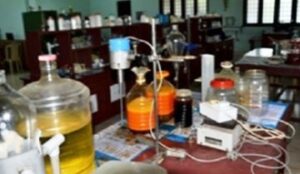
Bio-degradable greases derived from waste cooking oil are another multidisplinary research work. Bio-degradable greases derived from waste cooking oil offer a sustainable solution to lubrication needs while addressing environmental concerns. These greases are synthesized by converting the oil into a base stock and adding thickeners for consistency. They possess excellent biodegradability and low toxicity, reducing their impact on ecosystems. These greases find applications in various industries, including automotive, food processing, and agriculture. They provide lubrication for bearings, gears, chains, and other mechanical components, ensuring smooth operation while minimizing environmental harm. Additionally, they can be utilized in environmentally sensitive areas such as marine environments, where conventional greases pose a threat. By repurposing waste cooking oil, bio-degradable greases promote circular economy principles and contribute to a greener future.
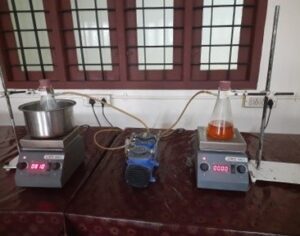
Highlights:
|
|
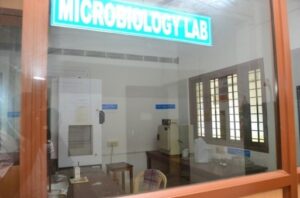
The thin film laboratory is equipped with DC sputtering unit, strain gauge and other related equipments. The division has been able to complete successfully some research projects with finical assistance from external funding agencies. The major research projects carried out in the division are:-
Highlights:
|
|
|
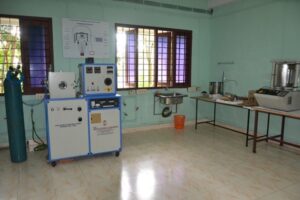
The Nanotechnology lab works on frontier topics in synthesis and application of nanomaterials. The major area of application is catalysis. Research focuses on porous material synthesis, immobilization of enzymes on porous materials, application of immobilized enzyme sensors, porous materials for photocatalysis, etc.
Major sponsored research projects carried out in the lab are :-
|
|
The lab is equipped with a Glass Body Multiple Autoclave Reactor System for hydrothermal synthesis of porous materials, a Xe-arc lamp light source photoreactor system and a high temperature H2 reduction reactor system.
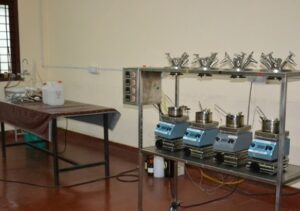
An Energy Efficiency Evaluation Lab (E3 Lab) has been set up which focuses on the various power quality issues and their mitigation techniques. The department has played an active role in the energy conservation activities of the institute which helped it to bag the Kerala State Energy Conservation Award 2009 and Commendation Certificates 2011 and 2012. The Energy saving measures commended by Energy Management Centre includes:
|
|
|
|
|
|
|
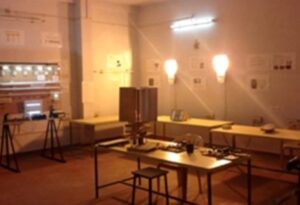
The Advanced communication lab is configured for testing and evaluating electronic building blocks like Antenna, Subunits like Amplifiers, Oscillators, Mixers, Power dividers etc. limited to a frequency range up to 3 GHz with thrust on the mobile band. The lab is equipped with Network Analyzer, Spectrum Analyzer and lab test Components like Dipole Antenna, Adaptors, Cables and Terminators. The following experiments can be done in the Advanced communication lab:- Antenna Testing: Drive the transmitting Antenna from the Network Analyzer source and feed the output from the receiver to the Network analyzer. The lab can also undertake –
|
|
|
|
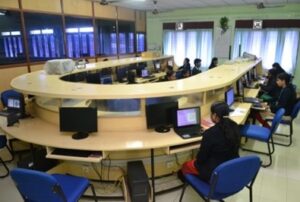
The Embedded Systems Lab is configured for testing of simulation in various Embedded related areas
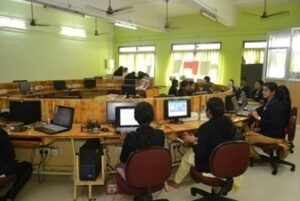
The Variable Compression Engine upgradation was carried out to enable students and staff to undertake research in the area of Internal Combustion Engines with a focus on studies in the field of Engine combustion.With the addition of CRDI Technology to the fuel system, the combustion can now be mapped using parameters such as main & pilot injection timing, injection quantity and the rail pressure. The above parameters may be varied to analyze their effect on the engine performance as well as emission characteristics.Research can now be conducted with the optimal combination of combustion parameters and thus scientific knowledge may be gained. Such knowledge shall be disseminated by way of research papers to add to the existing domain of knowledge.
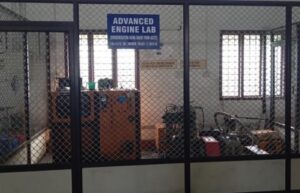
MODROB funded machine learning lab is specially designed for research in machine learning-related applications. The lab was set up using the MODROB fund sanctioned by AICTE.
The objective of this laboratory is to identify the innovative research directions in artificial intelligence and machine learning and to understand the current industrial requirements in terms of technical projects. The lab serves as a maker space for students and research members in the department.
System Specifications
Intel Core i7 9th gen, 32 GB DDR4 Ram, 480 GB SSD, GeForce RTX 2060 8G Graphics card with22″ LED monitors Full HD
Undergoing Research Projects at the Lab
|
|
|
|

